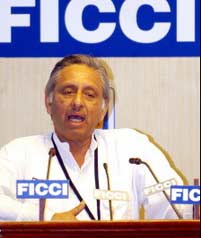|
'Joint energy move to benefit India, China'
(AFP)
Updated: 2005-08-26 13:54
Plans by Asian giants India and China to mount joint bids for foreign energy
projects are still at a "pioneer" stage and will not end their rivalry for
resources, a top Indian government official said, AFP reported.

Indian Oil Minister
Mani Shankar Aiyer. [AFP] | India, which has been
scouring the globe for fuel supplies to feed its fast growing economy, said
earlier this week major Indian oil companies would sign cooperation pacts with
China's top energy firms later this year.
The head of the Indian oil ministry's international division said plans for
collaboration by the neighbours were still at an early phase.
"We are at the pioneer stage. We are taking the first footsteps of
cooperation," Talmiz Ahmad told AFP late Thursday.
He added that "cooperation does not exclude competition" for resources by
India, which imports nearly 70 percent of its oil needs, and China, which relies
on foreign producers for one-third of its oil supplies.
They have been arch rivals for stakes in oil and gas projects around the
world. On Monday, India's state-run Oil and Natural Gas Corp (ONGC), narrowly
lost to China in a bid for Kazakhstan's third-largest oil producer.
Afterwards, India's Petroleum Minister Mani Shankar Aiyar said the loss
underscored the "need for China and India to adopt a collaborative approach in
bidding... whenever possible."
"On the basis of assessments (Indian and Chinese) companies will make, we
will cooperate and we will compete," Ahmad said. "Hopefully we will cooperate
more than we compete."
Memorandums of understanding between companies such as India's ONGC and
Indian Oil Corp and Chinese firms Sinopec, China National Petroleum Corp and
CNOOC will be signed when Aiyar visits China in November.
Afterwards, "a joint bilateral working group will be set up to monitor
progress of cooperation and promote the momentum of cooperation," Ahmad said.
The countries will focus their attention on four main areas -- the Caspian
Sea region, Central Asia, Africa and Latin America, Ahmad said.
"In the first instance, our companies will engage (with Chinese companies) in
an information-sharing dialogue on specific proposals with a view to coming up
with possible joint offers," he said.
India first raised the idea of cooperation in talks with the Chinese after
the left-leaning Congress government was elected in 2004.
The petroleum minister asked "whether instead of competing with each other,
which we're doing robustly, we could consider cooperation," Ahmad said. "The
broad message we got is they're very anxious to cooperate."
Ahmad added a senior Chinese company official told him when he visited China
this month as part of an Indian Joint Task Force that "once Indian and Chinese
companies join together, there will be no targets beyond them."
Analysts say cooperation would give India and China negotiating muscle but
add that political and cultural differences might be difficult to overcome.
Ahmad dismissed suggestions by analysts that Washington, which is looking at
India as an economic and political counterweight to China in Asia, might be
uneasy over energy cooperation between the neighbours.
"We both share a long common boundary -- both history and geography dictate
we will have to work together," he said. Energy cooperation was a "natural"
outcome of fast-growing trade and increasing political co-operation.
"This is a world of multiple engagements and multi-polar linkages," he added,
saying India was also seeking energy cooperation with the United States.
"Any attempt at (imposing) exclusiveness will fail."
|